Past Events

Improvement Coaching Workshop
The California Quality Collaborative’s 2024 Equity and Quality at Independent Practices in LA County Annual Convening is a day of insightful discussions, collaborative activities and innovative thinking aimed at enhancing health care quality and sustainability for improvement collaborative participants.

Behavioral Health Integration Financing Convening
The California Quality Collaborative’s Behavioral Health Integration Financing Convening brings together stakeholders to explore findings from statewide interviews on sustainable payment practices and brainstorm improvement opportunities for integrating behavioral health into primary care.

PBGH System of Excellence Pre-Launch – San Antonio
Join PBGH and our employer members in San Antonio, Texas on July 31, 2024, for the pre-launch of PBGH’s groundbreaking System of Excellence coming to Texas in 2025.

2024 California Advanced Primary Care Initiative Annual Convening
The California Quality Collaborative’s 2024 California Advanced Primary Care Initiative Annual Convening brings together initiative participants for a day of insightful discussions and innovative thinking around advanced primary care in California.

2024 EQuIP-LA Annual Convening
The California Quality Collaborative’s 2024 Equity and Quality at Independent Practices in LA County Annual Convening is a day of insightful discussions, collaborative activities and innovative thinking aimed at enhancing health care quality and sustainability for improvement collaborative participants.

CQC Webinar: Behavioral Health Integration – Children and Youth Collaborative Learning Exchange Program
BHI-CYCLE is a nine-month learning collaborative beginning October 2024 that will bring together organizations experienced in integrating behavioral health services into primary care for children and youth.

2024 CalHIVE Behavioral Health Integration Annual Convening
The California Quality Collaborative’s CalHIVE Behavioral Health Integration Annual Convening is a two-day learning and networking session for improvement collaborative participants.

CQC Roundtable: Medi-Cal Incentive Measure Alignment
The California Quality Collaborative’s Medi-Cal Incentive Measure Alignment Roundtable brings together representatives of Los Angeles’ managed care plans, medical groups, independent physician associations and other invited guests to discuss the current Medi-Cal incentive landscape within Los Angeles County, identify areas for alignment and standardization across participants and foster collaboration between stakeholders.

CQC Webinar: Addressing Disparities in Colorectal Cancer
In honor of March as Colorectal Cancer Awareness Month, CQC hosted a webinar to address disparities in colorectal cancer screening and treatment.

Measuring Advanced Primary Care in California: Pilot Results and the Path Forward
Join this CQC webinar to hear results and stakeholder reactions to the California Advanced Primary Care Measurement Pilot and explore the best next steps for the California health care system.
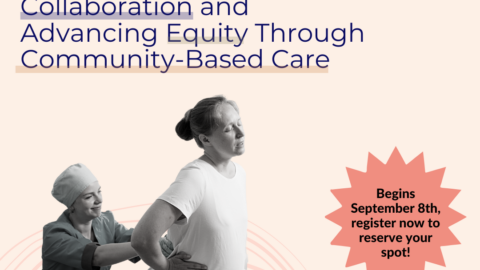
Virtual Learning Series: A Birth Center Primer for Hospital Leaders
This free, six-part virtual Learning Series will help hospital leaders develop a strategy to strengthen their relationships with freestanding birth centers within their communities or establish a new birth center.

CQC Roundtable: Improving Specialty Care Access
The California Quality Collaborative’s Improving Specialty Care Access Roundtable brings together stakeholders to discuss potential opportunities, share ongoing initiatives and identify ways to collaborative to improve access and equity to specialty care in Northern California.

DxF Funding Opportunities and How to Apply
Rapid data exchange within the health care delivery system is integral to achieving equitable, patient-centered care for all Californians.

Behavioral Health Integration Fundamentals: Concepts & Models
Integrating behavioral health into primary care is essential for providers looking to deliver patient-centered, high-quality and whole-person care. Yet many health care organizations struggle with knowing where to begin.

CalHIVE Behavioral Health Integration Improvement Collaborative: Informational Webinar
The CalHIVE Behavioral Health Integration Improvement Collaborative is a three-year program launched in July 2023 and will focus on supporting California based provider organizations as they integrate behavioral health services into their primary care practices.

CQC Webinar – CalHIVE Network: Lessons for Achieving High-Quality Virtual Care
This webinar highlighted the outcomes of the CalHIVE Network, a two-year improvement collaborative focused on improving care for people with diabetes and asthma by maximizing the use of virtual care tools.

CQC Webinar – Improving the Collection and Use of Race, Ethnicity and Language Data
A panel of experts will discuss the importance of improving the collection and use of race, ethnicity and language (REaL) data and how that data can help address health disparities.

CQC Webinar – Behavioral Health Integration: Telehealth Promising Practices
Hear on-the-ground lessons around behavioral health integration, and understand opportunities around effective virtual care.

CQC Webinar – Advanced Primary Care: Piloting Practice Level Measurement
A webinar describing the next step in California’s journey to scale high quality, efficient and patient-centered primary care, also known as Advanced Primary Care (APC).

CQC Webinar: Increase Adverse Childhood Experiences (ACEs) Screening
Part of our ongoing Accelerated Integrated Care Series, Adverse Childhood Experiences (ACEs) are potentially traumatic events that occur in childhood and have been linked to more than 40 negative health conditions.

CQC Webinar: Resilient Primary Care – Insights into Virtual Patient Engagement
Today, telehealth is more accepted by patients, providers and plans, but there may be disparities in how under-represented patients experience virtual care.

CQC Webinar: Back to School: Close the Gap on Pediatric Immunizations
During this California Quality Collaborative webinar, the California Department of Public Health will share statewide data trends regarding catch-up pediatric immunizations.

Primary Care Payment Reform Workgroup
Employers know that primary care is essential to a healthy workforce and employees’ access to a high-value health care system.

CQC Webinar: Increase Depression Screening
In this meeting, attendees shared challenges and questions related to depression screening at their organizations, and identified a next step they could apply at their own organizations.

CalHIVE/Resilient Primary Care: Strengthening Your Telehealth Strategy
In this webinar, we were joined by David Ford of the California Medical Association as presenters shared a framework to strategically plan around telehealth and virtual care.
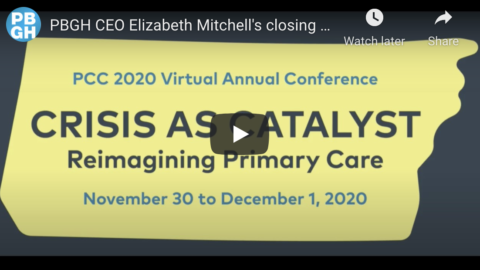
Reimagining Primary Care
Large employers and primary care doctors align on the attributes of high-quality primary care.

CMA & CQC Joint Webinar – Lessons from the Field: Post-Telehealth Implementation
Joint webinar with the California Medical Association (CMA) where attendees heard from clinician speakers who offered technology, workflow, and documentation improvements tested and adopted in virtual and hybrid care settings.
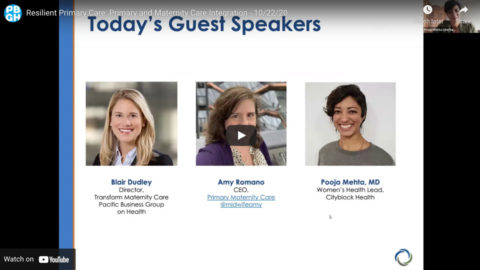
Primary & Maternity Care Integration
We learned what primary care practices can do to improve the health of pregnant individuals.

Accelerating Integrated Care: Measure Screening and Access for Behavioral Health
Second webinar in Accelerating Integrated care series, attendees learned why measuring behavioral health screening and access is important.
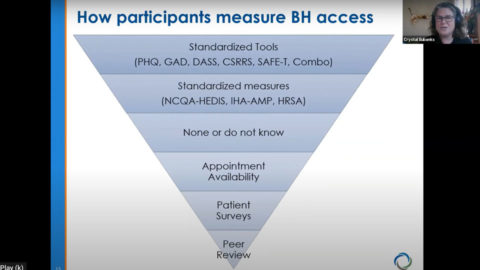
Measure Screening and Access for Behavioral Health
Results from a Patient Assessment Survey (PAS) from a study of 35,000 patients across California were shared and discussion about how organizations can use data to help identify populations that need additional mental health support.
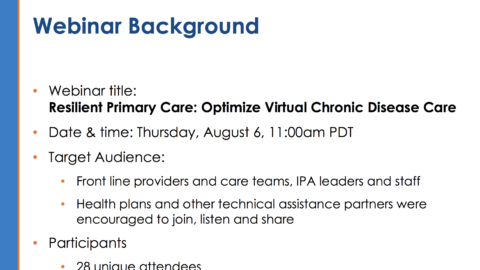
Optimize Virtual Chronic Disease Care
Attendees discussed opportunities and identified challenges in sustaining virtual chronic disease care, and heard how participation in our CalHIVE Network can improve telehealth operations.
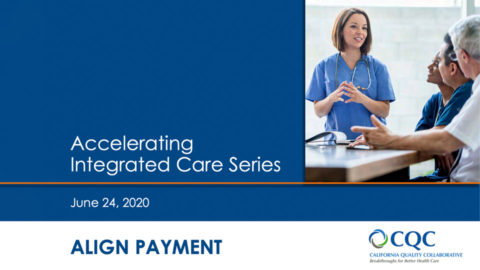
Align Payment
Melora Simon, Dr. Tiffany Nelson, and Julie Fortune discuss the findings highlighted in the CQC authored, CHCF Issue Brief, “Weaving Together Mental and Physical Health Care Outside the Safety Net.”
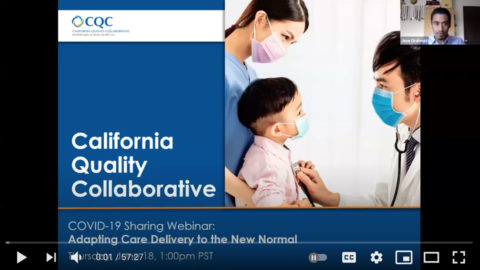
COVID-19: Peer Sharing
In response to the COVID-19 pandemic, small practices and IPAs made remarkable progress implementing and expanding telehealth in a very short timeframe, providing critical care to their patients.

COVID-19 | Billing for Telehealth and Virtual Care
We were joined by Carol Yarbrough, Business Operations Manager at UCSF’s Telehealth Resource Center and Dr. Subash, Fellow at UCSF’s Division of Rheumatology and Clinical Informatics.Summary is also available to view.
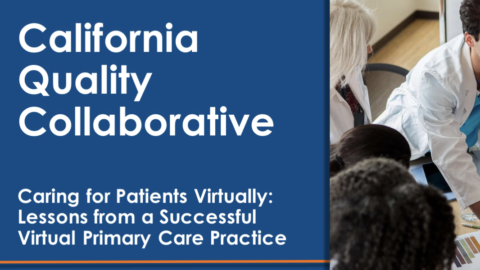
Caring for Patients Virtually: Lessons from a Virtual Primary Care Practice
We were joined by Dr. Yumi Taylor, Linette Fung, and Robert Scrase of Tera by Sutter Health. Tera delivers high-quality, patient-centered care, 95% virtually.
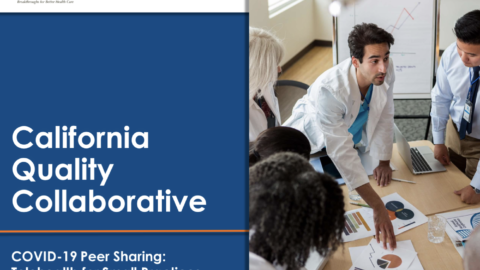
COVID-19 | Telehealth for Small Practices
We heard from two IPA leaders how they are supporting small and independent physicians to adopt and spread telehealth.
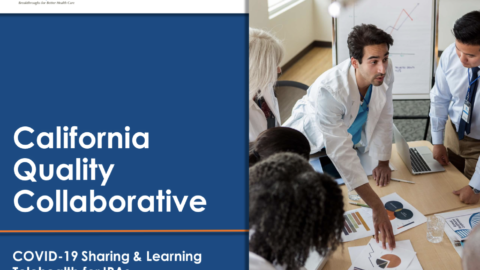
COVID-19 | Telehealth for IPAs
Share and learn webinar for IPA leaders who support small and independent physicians.
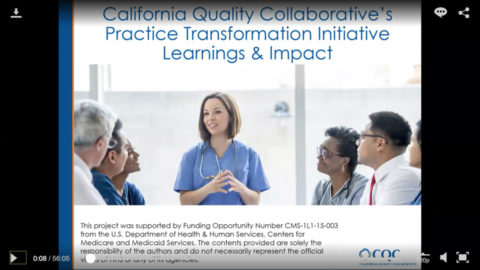
Practice Transformation Initiative (PTI)
The Practice Transformation Initiative (PTI) was a four-year initiative that engaged 4,800 clinicians statewide contracted with provider organizations to improve measures of cost, quality and patient experience.
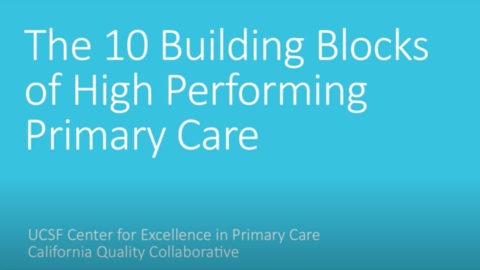
10 Building Blocks of High Performing Primary Care Series
In 2010-2011, the UCSF Center for Excellence in Primary Care (CEPC), an organization that identifies, develops, tests and disseminates innovations to improve primary care, conducted an intensive study on existing high performing practices and clinics to identify similarities in how they deliver primary care.
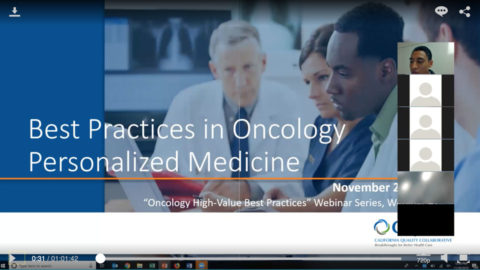
Best Practices in Oncology
In the second of CQC’s “Best Practices in Oncology” webinar series, guest speaker, Mark Pegram, MD, from the Standford School of Medicine, discusses how the availability of new molecular approaches allow us to identify vast numbers of different genetic alterations in each malignancy enabling oncologist to employ biomarkers for optimization of cancer patients’ treatment.
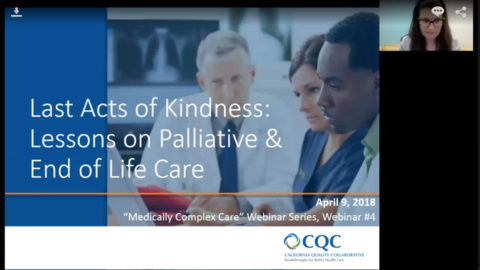
Last Acts of Kindness: Lessons on Palliative & End of Life Care
In the fourth of CQC’s “Medically Complex Care” webinar series, guest speaker Redwing Keyssar, RN, of Jewish Family & Children’s Services discusses the difference between hospice and palliative care and “normalizing” the conversation about serious illness.
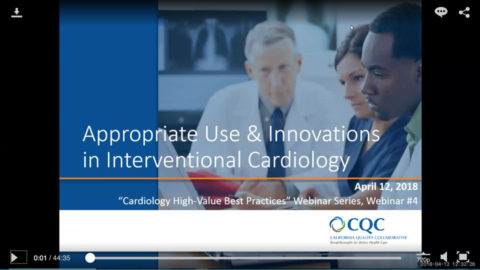
Appropriate Use & Innovations in Interventional Cardiology
Sameer Amin, MD, of HealthCare Partners presents on appropriate use and innovations in interventional cardiology, particularly on the medical and interventional treatment of coronary artery and valvular disease.
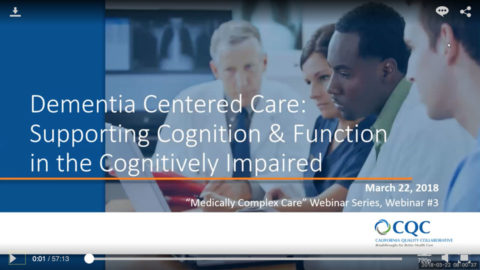
Dementia Center Care: Supporting Cognition & Function in the Congnitively Impaired
In the third of CQC’s “Medically Complex Care” webinar series, guest speaker Nick Bott, PsyD, of Stanford Medicine’s Clinical Excellence Research Center (CERC) discusses challenges of diagnosis, caregiving, and hospitalization for persons with dementia and how high quality care can reduce costs.

High-Value Treatment of Electrophysiology Disorders
Menacham Wakslak, MD, of The Heart Group presents on electrophysiology disorders and the medical and interventional treatment of atrial fibrillation, arrhythmia, and implanted cardiac devices.
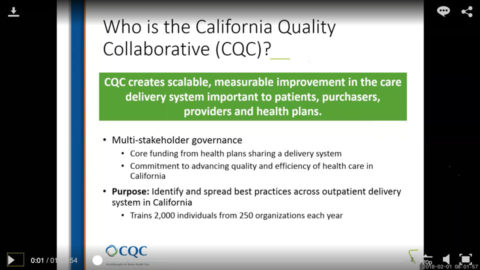
The Case for Patient Activation: Research Findings & Real World Examples
In the second of CQC’s “Medically Complex Care” webinar series, guest speaker Judith Hibbard, PhD, MPH, Professor of Health Policy at the University of Oregon, discusses interventions that increase patient activation, improve clinical outcomes, and reduce health care costs.
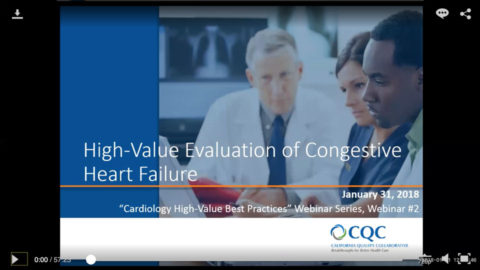
High-Value Cardiology Best Practices: Congestive Heart Failure
Sameer Amin, MD, of HealthCare Partners presents on guideline-based management of congestive heart failure, recent advancements, and the development of programs for improved outcomes.
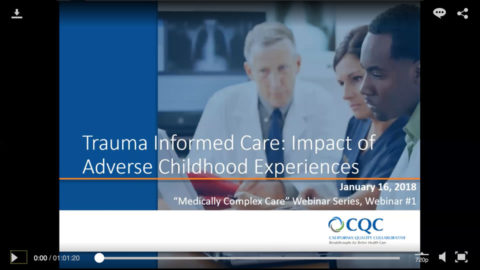
Trauma Informed Care: Impact of Adverse Childhood Experiences
In the first of CQC’s “Medically Complex Care” webinar series, guest speaker Laurie Lockert, MS, LPC, discusses how to assist people impacted by adverse childhood experiences and avoid burnout and cynicism in clinical staff.
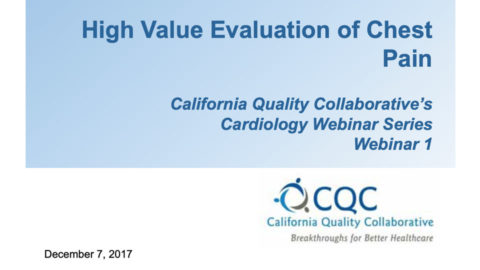
High Value Evaluation of Chest Pain
High Value Evaluation of Chest Pain pdf
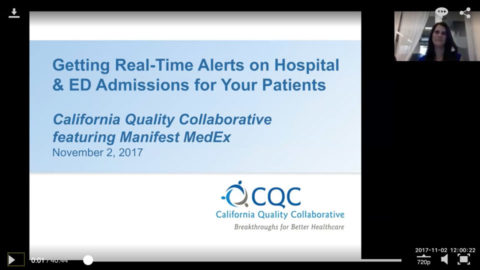
Getting Real-Time Alerts on Hospital & ED Admissions for Your Patients
CQC partners with Manifest MedEx to present on utilizing direct notifications for patient encounters at hospitals to improve coordination of care and reduce unnecessary utilization.